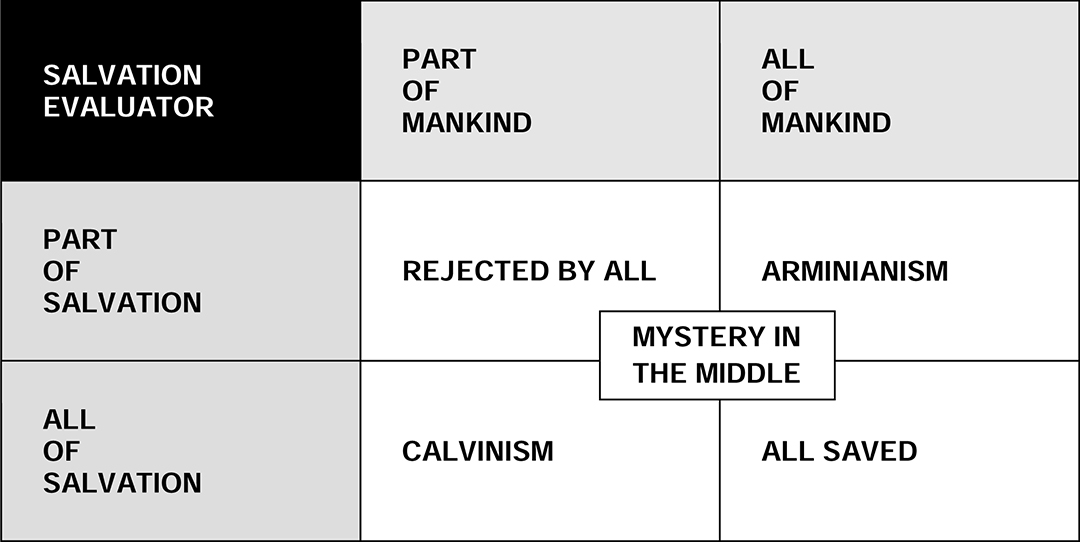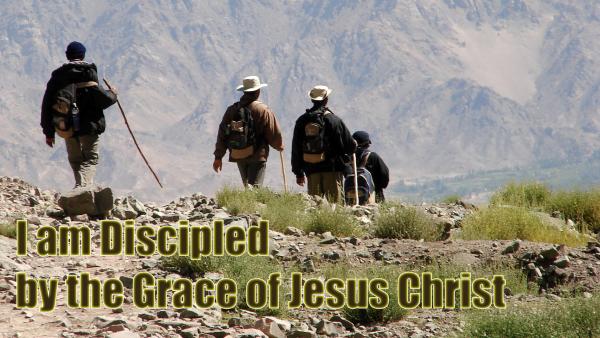Hopefully I have persuaded you to consider the weaknesses of the popular traditional salvation models. Both Arminianism and Calvinism are reasonable at points, but unreasonable at other points. These facts ought to be enough cause for every Christian to consider the interpretation of Scripture that Christ is victorious in the salvation of all mankind. Yet perhaps you still do not feel comfortable with ALL of PART, or PART of ALL, or ALL of ALL combinations of the Salvation Evaluator. Perhaps the Mystery in the Middle feels safer than parting ways with tradition.

However, before you try to find rest in the mystery in the middle, please consider a few more points. First, the majority of Christian thought has always insisted that Christian faith be reasonable. Faith properly defined and understood is confident reliance and trust on factual evidence. Israel was commended for their obedient witness and walk through the sea on dry land. However, later they are rebuked for not trusting God even though they witnessed the incredible first hand fact of his power to deliver.
Christianity likewise requires no "leap of faith," but instead confident trust in the facts of Jesus Christ's life, death, and resurrection. So Arminianism and Calvinism are at least commended for being coherent reasonable systems. They refuse to stand on mystery. Yet, even so they remain at odds with Scripture.
So please consider again the two questions posed by the Salvation Evaluator.
Is God the savior of ALL or PART of mankind?
Does God do ALL or PART of the saving?
Can you find any possible middle ground between God as savior of ALL or savior of PART? Any reasonable model of understanding must make one choice, ALL or PART! Can you find any middle ground between God doing ALL or PART of the saving? Is there any middle ground between UNCONDITIONAL and CONDITIONAL love? Any reasonable model of understanding must make one choice, ALL or PART!
Second, there have been some forms of Christian faith that have emphasized Sacred Mysteries as introduced at https://en.wikipedia.org/wiki/Sacred_mysteries. Some may argue that the Trinity and Divinity of Jesus fall into the realm of mystery and so salvation is also a mystery. Certainly the knowledge of God himself and his love extends beyond our abilities to comprehend. Paul tells us in Ephesians 3:8 (WEB), that the riches in Christ are "unsearchable." He says again in Ephesians 3:18 (WEB) that Christ's love "surpasses knowledge." And yet again in Romans 11:33 (WEB), "How unsearchable are his judgments, and his ways past tracing out!" Yet these statements are about God himself.
However, are the facts of our salvation also a mystery? Certainly not! The Bible promises that through faith we can have confident knowledge of our salvation. John writes in 1 John 5:13, "...that you may know that you have eternal life..." Do we have confident knowledge of our salvation? If we answer yes, then I ask, "On what basis?" I have already shown that the Arminian Christian adds human condition into the salvation equation, and thus insecurity. I have also shown that the Calvinist Christian adds self-deception into the salvation equation suggesting that they are loved, but not all. So then is mystery the missing ingredient in the salvation equation?
Friends, the mystery in the middle is the worst of all places to stand! Faith is confident reliance upon the facts of Jesus Christ. How could it be better to ignore the beautiful facts of Christ and his Word in order to stand on the question mark of mystery? Why choose this model of understanding? Should we explain the apparent conundrum of salvation with the appeal to mystery? We must not trust our salvation and the damnation of others to a mystery! Jesus Christ is not a mystery, but instead he is the mystery revealed! Colossians 1:26 says (WEB), "the mystery which has been hidden for ages and generations. But now it has been revealed to his saints." We must trust that Christ loves us and our neighbors, unconditionally! Salvation is neither a mystery nor a paradox as further discussed in my Appendix article, Real or Apparent Paradox?
Finally, regarding faith we are reminded,
Now faith is assurance of things hoped for, proof of things not seen.
Hebrews 11:1 (WEB)
Just because we cannot see the things we hope and trust in does not mean they are a mystery! Instead, exactly the opposite is true. Christian hope is founded on the rock solid facts of Jesus Christ!











